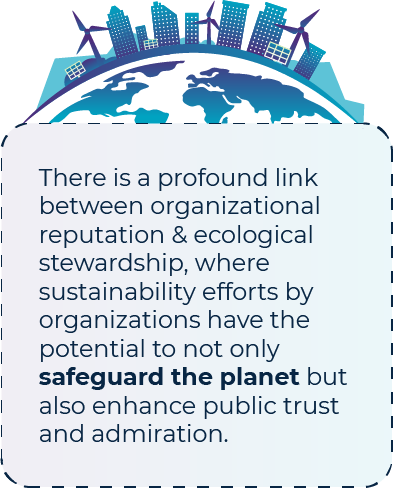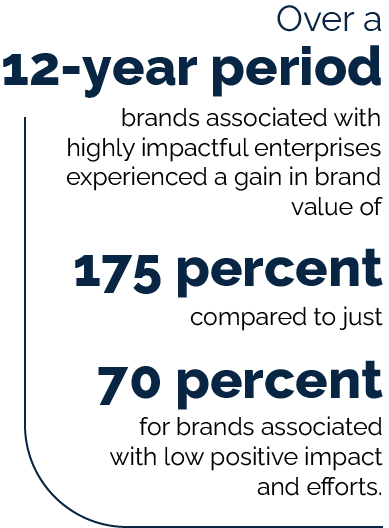In Brief
- Sustainability as a Corporate Pillar: Businesses are embracing sustainability, extending beyond ecological conservation to improving public perception and trust by showcasing their commitment to ethical and responsible practices.
- Brands Aligning with Values: Companies promoting sustainability experience a notable brand value increase, resonating with consumers who prefer aligning their purchasing decisions with their values.
- Navigating Digital Transparency: In a digital era, organizations face increased scrutiny, where proactive sustainability initiatives can mitigate negative exposure and demonstrate a commitment to addressing environmental challenges.
In an era defined by escalating environmental concerns and a collective call for responsible practices based around corporate social responsibility, the significance of sustainability efforts extends far beyond mere ecological conservation. As organizations navigate the intricacies of public perception, implementing robust sustainability initiatives seems to be the potent catalyst for reshaping the way they
are perceived.
Sustainability as a Pillar of Corporate Social Responsibility.

From careful resource management to ethically driven supply chains, businesses are realizing that their commitment to sustainability resonates deeply with an increasingly eco-conscious customer audience.
Being a sustainable organization falls under the umbrella of social corporate responsibility, which
conveys to customers that the organization goes beyond chasing profits and can be trusted to incorporate ethics into their decision-making, as well as initiatives that
benefit society. According to the Kantar Purpose study conducted in 2020, as brands have become more powerful than ever, the public expects them to utilize this power responsibly, a sentiment summarized as: “I like brands that have a point of view and stand for something.”
Brands with Purpose: Aligning Values with Purchasing Decisions
There is a clear relationship between a company’s expansion and how much it appears to be promoting sustainability.
Embracing sustainability can transform an organization’s brand identity to extend beyond profits to being purpose-driven, resonating with consumers who seek to align their values with their purchasing decisions.
Another report compiled by the Conference Board and The Harris Poll in September 2021 provides a comprehensive insight into this. More than a third of consumers in the survey based on sustainability perceptions say industries are making a positive impact, however, the answer also varies greatly by demographics.

The report includes the point of view of 1,923 US citizens. The definition of sustainability wasn’t provided to them at the time of the survey – instead, they were asked about what a sustainable organization should be practicing. The report regarded sustainability to be associated with issues pertaining to the environment such as global warming and climate change, as well as the incessant use of natural resources, more so than any of the social issues like fair wages and a safe working environment.
Attracting Talent with a Triple Bottom Line Focus
The results of the survey indicated that customers see utilities, technology, and food companies leading
the sustainability narrative. Homebuilders, automakers, restaurants, pharmaceutical makers, and home appliance makers were close behind. Transparent reporting on sustainable practices and environmental
impact can help organizations establish trust with stakeholders, which includes consumers, investors, and regulatory bodies.
However, these perceptions matter in attracting and retaining talent as well. A Business News Daily article quotes Susan Cooney, head of global diversity and inclusion at Symantec: “The next generation of employees is seeking out employers that are focused on the triple bottom line: people, planet, and revenue.”
Since corporate revenue has been recovering from the recession and has been increasing, customers now anticipate that part of that profit will be invested into programs that give back to the community.

The Porter Novelli Purpose Tracker 2021 survey respondents add to this information, with 70% stating that they wouldn’t work for a business without a clear mission. A sustainable organization is more likely to attract potential employees who feel it is important to be focused on this ‘triple bottom line’.
Navigating the Evolving Landscape
In today’s era of rapid information sharing via social media and online channels, organizations are
subject to increased scrutiny and the possibility of facing backlash due to their unsustainable actions.
However, by embracing sustainability initiatives, organizations can take proactive steps to reduce the likelihood of negative exposure and reputational harm stemming from environmental or ethical
violations.
Demonstrating a constructive response to environmental concerns through sustainable actions not only highlights an organization’s flexibility but also underscores its dedication to tackling pivotal challenges.
On the other hand, while there is consumer interest in supporting and purchasing from brands that present themselves as champions of sustainability, it is not always feasible for them to do so. Sustainable products or services come with a higher price, which is not affordable for all.
There must be innovation to produce eco-conscious and sustainable products at more convenient pricing. Business organizations need strategic planning to develop eco-friendly technologies, processes, and products that engage a wider audience.
References:
1. https://www.conference-board.org/topics/consumers-attitudes-sustainability/US-consumers-sustainability
2. https://www.businessnewsdaily.com/4679-corporate-social-responsibility.html










